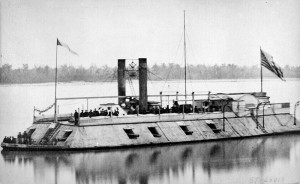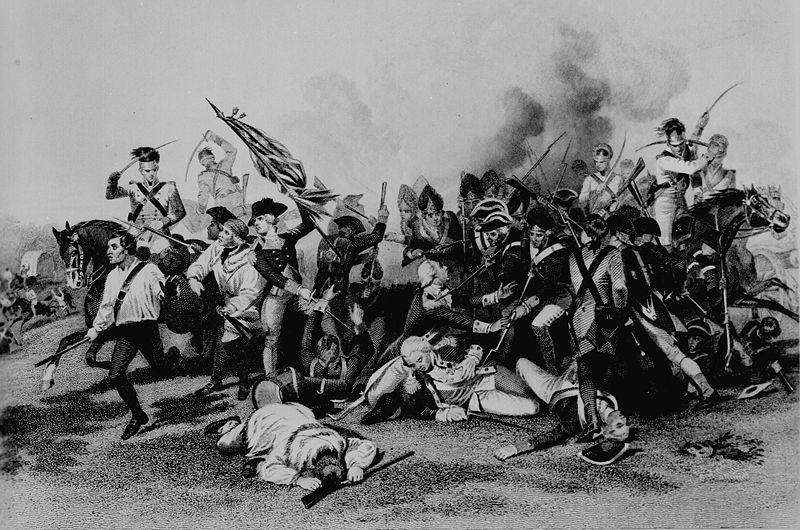The Mississippi might be basically under Federal control now, but the Richmond press can still celebrate signs of rebel life out west.
From the Richmond Daily Dispatch July 22, 1863:
Destruction of a Federal gunboat by a torpedo.
A dispatch was yesterday received at the Navy Department, in this city, from Commander Brown, dated Yazoo City, July 20th, stating that the Federal shipgunboat DeKalb, thirteen guns, had been totally destroyed, on the 18th, by the explosion of a torpedo which had been placed in the Yazoo river to prevent the Federal war vessels from ascending that stream.
Some editorializing on the Dekalb’s destruction:
A Streak of Luck.
One Yankee gunboat, at any rate, has been sent to kingdom come on the Yazoo by a torpedo! We are rejoiced to hear of it, and are not very solicitous about the fate of those on board of her. On the contrary, we wish it had been the whole Yankee navy, instead of a single vessel. This is but a foretaste of what they are to expect in their attempts to navigate our waters without our permission.
And with all that happened in early July the editors promote some stoicism and equate the Southern sufferings with that of Americans in the Revolutionary War:
Reveries and Successes.
There is no surer test of a great character than adversity. It is the furnace which separates the valuable from the worthless, which makes manifest the dross, and refines and glorifies virtue. The world itself is but a disciplinary school for a future and more enduring state. The people of this country are passing through a period of unexampled trial, individually and nationally, but it may be necessary, both to the development of their national and individual character. It would be a bitter disappointment, on the eve apparently of deliverance from our protracted and cruel sufferings, to be thrown back once more upon a life and death struggle, but it is the dictate alike of religion and philosophy to bow with resignation and fortitude to the will of the Supreme Disposer of events, and to go on doing our duty with cheerful and determined hearts. The mariner, who, after a long and tempestuous voyage, is driven back by the tempest to the open sea, just as he is about entering his long desired haven, does not permit his energies to relax or his hopes to be extinguished, but prepares himself to battle afresh with the storm and sea, waiting in confidence and fortitude for the time when propitious winds and waves shall bear him to his destined port.
It is not for man, short sighted and fallible, to interpret the designs of Providence; but the great current of events, since the beginning of this war, has seemed to indicate the interposition of a higher than any human power in behalf of the cause of Southern independence. How else has a people one fourth the numbers of its adversaries, almost destitute of arms and appliances of war, with few mechanical resources, and shut out from other nations, been able to cope successfully for more than two years with a gigantic Power, which had at its unlimited command the men, the means, the manufactories, and the workshops of the world? Such astounding results can scarcely be attributed to human wisdom or human strength. Why, then, should the most desponding be cast down by occasional reverses, which may, after all, be needed to teach us a lesson of humility and to place our confidence in Him who “is alone the give of all victory?” If we cannot always achieve success, let us at least deserve it.–If our heroism cannot always triumph our fortitude can at least enable us to endure. If we are made of the true metal, we shall rise, like AutÅus, refreshed and reinvigorated from our contact with the earth. Our Revolutionary fathers toiled and bled through a war more than three times as long as this, and suffered greater and more protracted disasters than any we have experienced. If we are worthy to be their children, we shall imitate their example — we shall know how to endure adversity as well as to enjoy prosperity — we shall manifest patience, perseverance and faith, as well as courage, and in the end shall achieve, as in the war of ’81, the bright reward of National Independence.
Wikipedia says the ironclad USS Baron DeKalb was sunk on July 13, 1863.
Johann de Kalb ” was a German-born French officer who served as a major general in the Continental Army during the American Revolutionary War.” He was mortally wounded at the 1780 Battle of Camden. As he was dying, DeKalb reportedly said “I thank you sir for your generous sympathy, but I die the death I always prayed for: the death of a soldier fighting for the rights of man.”


